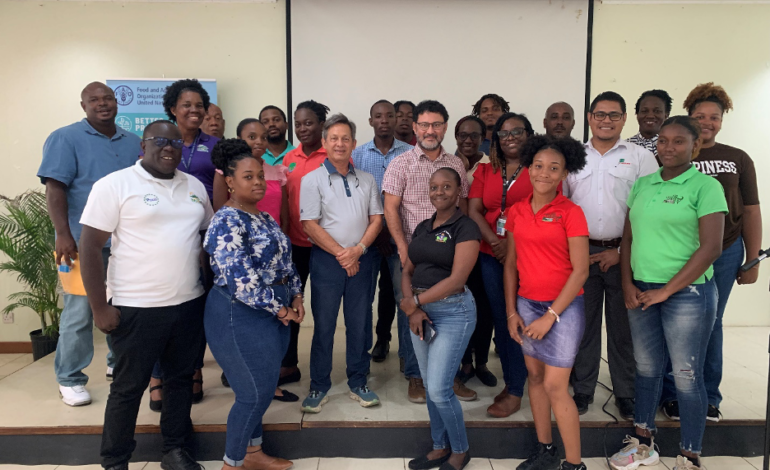
Biological control agents can be produced locally to reduce pesticide use
7 February 2025 – Castries, Saint Lucia – The Food and Agriculture Organization of the United Nations (FAO) is collaborating with Zamorano University in respond to the request from the Ministry of Agriculture, Fisheries, Food Security and Rural Development to introduce and promote the use of biological control agents in Saint Lucia.
FAO and Zamorano University signed a letter of Agreement to support the implementation of activities to achieve the process of providing alternative options for farmers to control pest and diseases reducing the use of pesticides. During the week, two Zamorano experts, FAO Agriculture Officer and personnel form the Ministry of Agriculture were visiting fields to assess agricultural systems including main pest/diseases, types of crops, technologies and practices, knowledge of farmers and extension officers in different agro-climates. Zamorano experts also assessed existing capacities and staff in the laboratories at the National Diagnostic Facility (NADF). The week ended with training a group of 23 participants including plant protection officers, extension officers and students from agriculture college on Integrated Pest Management (IPM) with emphasis on biological control agents.
The Ministry of Agriculture sought FAO’s technical assistance to evaluate the feasibility of locally produce different types of biological control agents increasing access to farmers with alternative options to control pest and diseases that are efficient and non-harmful for farmers and consumers improving food safety. Initial conclusions indicate that it is possible to produce selected biological control agents using existing capacities at NADF. Under the FAO-Zamorano University agreement, two staff from NADF will be trained working at the Universities’ laboratory for a practical learning on how to produce biopesticides, beneficial insects (natural enemies), entomopathogenic nematodes and beneficial bacteria. NADF staff will be returning to St. Lucia with strong knowledge and practical experience to begin identification of local biological control agents, production and distribution to farmers. This initiative will provide opportunities for farmers to have more options rather than only chemical pesticides to manage pest and diseases that affect crops. It is expected that the region will be benefiting from this FAO-Zamorano agreement having St. Lucia receiving staff from other Caribbean countries to get trained.
In speaking about this initiative which considered the island’s high susceptibility to climate change and increased pest/diseases, Mr. Melvin Medina Navarro, FAO’s Plant Production and Protection Officer stated, “Zamorano University possess vast experience in research, commercial production and increased access to small, medium and large-scale farmers in Central America under tropical conditions. Based on St. Lucia’s newly installed capacities, this agreement will help to produce certain biological control agents increasing access to alternative and sustainable solutions to control pest/diseases affecting fruits, vegetables as well as roots and tubers”.
Ms. Hannah Romain, Chief Plant Research Officer from the Ministry of Agriculture in charge of NADF, expressed, “This intervention by the FAO in supporting St Lucia in building capacity in integrated pest management specifically biological control is very timely. Over the past years the Ministry has been promoting Integrated pest management in the face of climate change and to ensure food safety practices among farmers. The Ministry welcomes the expertise from Zamorano University and looks forward to building a safe and secured agricultural system”.
Mr. Rogelio Trabanino, Senior Professor and Chief of the Biological Control Laboratory at Zamorano University, stated that, “The visit to St. Lucia was interested since we learned listening directly from farmers about their main problems and pest control methods. This is important to decide what natural enemies will be ideal to implement. We had a great experience with participants at the workshop as they demonstrated enthusiasm with technical information and activities that will be realize in future activities. The facilities at the diagnostic laboratory are impressive and that will impact in the initiation of the project because once the technicians are trained at Zamorano, they will come directly to start a small-scale production”.
By applying the skills and insights gained from this activity and training, stakeholders in S. Lucia’s agricultural sector will be better equipped to strengthen sustainable local crop production, improve health, enhance food safety, and build a sustainable and resilient future.








